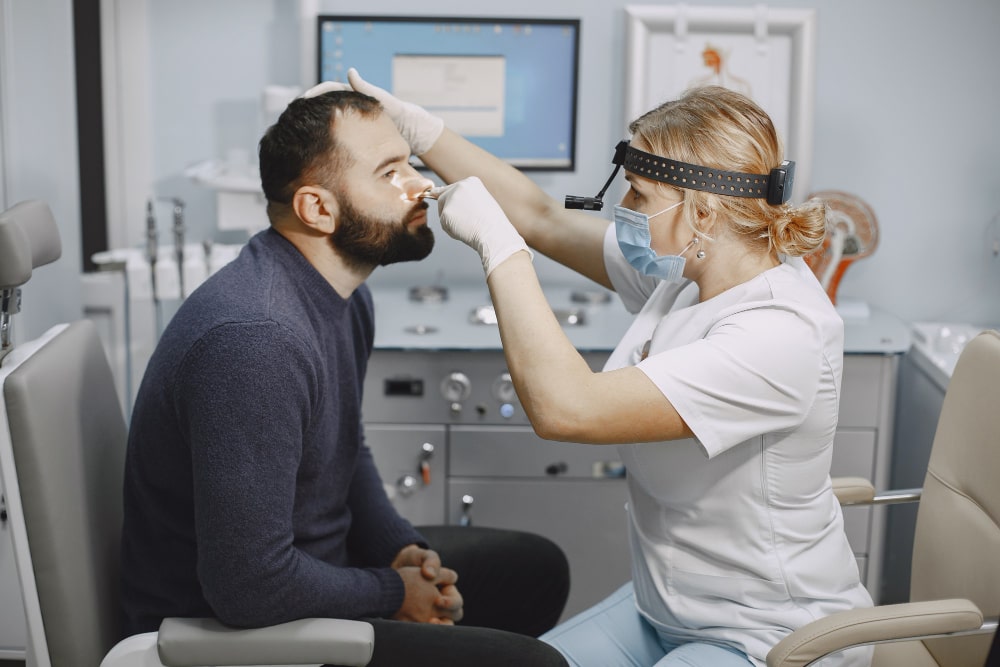Sinus infections, also known as sinusitis, are fairly common in adults and children alike. It’s important to understand the signs and symptoms of a sinus infection so that you can take proper action when needed. But what role does sinus infection play when it comes to dizziness? In this article, we’ll explore can a sinus infection make you dizzy, the link between sinus infections and dizziness, and how to prevent and treat them.
Understanding Sinus Infections
Sinus infections are caused by inflammation of the sinuses. The sinuses are a network of air-filled cavities behind your nose and cheeks. When you have a cold or allergies, these cavities become blocked with mucus, leading to infection. Sinus infections can be caused by a number of factors, such as viral or bacterial infection, allergies, and chronic sinusitis.
Definition of Sinus Infection
A sinus infection is an inflammation of the lining of one or more of your sinuses. It is usually caused by bacteria, viruses, allergens, or irritants in the air.
Read More: Essential Oils for Sinus Infection: Quick Healing Naturally
Causes of Sinus Infections
There are many causes of sinus infections, including bacterial or viral infection, allergies, smoke inhalation, and structural problems in the nasal passages. Other factors that can contribute to a sinus infection include changes in temperature, humidity levels, air pollution, and excessive mucus production.

Symptoms of Sinus Infections
Common symptoms of sinus infection include nasal congestion, sinus headache, facial pain and pressure, postnasal drip, fatigue, and dizzy.
Nasal Congestion
Nasal congestion is a common symptom of a sinus infection. Symptoms may include difficulty breathing through your nose or a stuffy feeling in your nose.
Sinus Headache
Sinus headaches are a common sinus infection symptom and can cause pain in the forehead, cheeks, or nose bridge. The pain may worsen when you bend over or when you lie down. It is important to note that sinus headaches are not caused by tension or stress but rather by inflammation of the sinuses.
Facial Pain and Pressure
Facial pain and pressure are common sinus infection symptoms and can cause tenderness, aching, or throbbing in your cheeks, forehead, or around your eyes. This discomfort may worsen when you bend over or when you lie down.
Read More: Can a Yeast Infection Cause a UTI ? How to Treat It
Postnasal Drip
Postnasal drip is a common symptom of sinus infection. It can cause a feeling of mucus running down the back of your throat and a sore throat or coughing.
Fatigue
Fatigue is another common symptom of a sinus infection and can be caused by irritation to the lining of the sinuses or from the body’s response to the infection.
Dizziness and Vertigo
Dizziness and vertigo can also be a symptom of a sinus infection. This is because the inner ear is connected to the sinuses, and inflammation in the sinuses can cause irritation of the inner ear.
Can a Sinus Infection Make You Dizzy?
Yes, a sinus infection can make you dizzy. The inner ear is connected to the sinuses, and inflammation in the sinuses can irritate the inner ear. This can lead to feelings of dizziness or vertigo. Additionally, some medications used to treat sinus infection can cause dizzy as a side effect.
The Link Between Sinus Infections and Dizziness
The link between sinus infection and dizzy is due to the fact that the inner ear and the sinuses are connected. When there is inflammation in the sinuses, it can lead to irritation of the inner ear, which can cause feelings of dizziness and vertigo.
How Sinus Infections Can Lead to Dizziness
Sinus infection can lead to dizzy due to the irritation of the inner ear caused by inflammation in the sinuses. Some medications used to treat sinus infections may also cause dizziness as a side effect. It is important to talk to your doctor about any medications you are taking for a sinus infection and the potential side effects.
Read More: Sinus Massage: 4 Best Techniques to Cure Pain
Other Ear-Related Symptoms
In addition to dizziness, there are other ear-related symptoms associated with sinus infections. These include ear fullness, tinnitus (ringing in the ears), and hearing loss.
Ear Fullness
Ear fullness is a feeling of pressure or stuffiness in the ears. It can be caused by fluid accumulation in the middle ear due to an infection, allergies, or trauma. Sometimes, it may also be caused by a wax build-up in the outer ear canal.
Tinnitus (Ringing in the Ears)
Tinnitus is characterized by ringing, buzzing, or other noise in the ears. It can be caused by exposure to loud noises, an ear infection, allergies, certain medications, etc.
Hearing Loss
Hearing loss is the inability to hear sounds normally. It can be caused by exposure to loud noises, an ear infection, or a build-up of wax in the outer ear canal. It is important to talk to your doctor if you experience hearing loss associated with a sinus infection.
Read More: Sharp Pain Behind Eye: What Causes It, How to Relief
Seeking Medical Help for Sinus Infections

If you are experiencing symptoms of a sinus infection, it is important to seek medical help. Your doctor can properly diagnose and treat the condition and advise you on any lifestyle changes that may be needed to prevent future infections. In addition, they can advise you on any medications or treatments necessary to treat your sinus infection, including any medications that may cause dizziness as a side effect.
Diagnosis of Sinus Infections
Your doctor may diagnose a sinus infection based on your symptoms and a physical exam. They may also order imaging tests such as an X-ray or CT scan to help determine the cause of the infection. If they suspect a bacterial infection, they may take a culture sample of mucus from your nose for testing.
Treatment for Sinus Infections
Treatment for sinus infections depends on the cause of the infection. Bacterial infections are usually treated with antibiotics, while viral infections often require supportive treatments such as rest and fluids. Allergic rhinitis can be treated with medications such as antihistamines or nasal sprays. Surgery may sometimes be necessary to relieve chronic sinusitis or structural blockages.
Treatments for Dizziness
If dizziness is a symptom of your sinus infection, your doctor may recommend medications to treat the underlying cause. These may include antibiotics or antihistamines for bacterial and allergic infections, respectively. In addition, they may also recommend vestibular rehabilitation therapy (VRT) to help reduce symptoms of dizziness, vertigo, or balance problems.
Read More: Elbow Pain When Lifting: What Causes It, How to Treat It?
Home Remedies for Sinus Infections
In addition to medical treatment, there are some home remedies that can help relieve the symptoms of a sinus infection. These include nasal irrigation with a saline solution, using a humidifier, and steam inhalation. Additionally, it is important to get enough rest and stay hydrated. It is also recommended to avoid cigarette smoke and other environmental irritants.
Medical Treatments for Sinus Infections

In addition to home remedies, your doctor may recommend medications to treat a sinus infection. These can include antibiotics or decongestants to help reduce inflammation and open the airways. Some people may also benefit from corticosteroids, which can help reduce inflammation in the nasal passages and sinuses. It is important to talk to your doctor about any medications you are taking for a sinus infection and the potential side effects.
Prevention of Sinus Infections
The best way to prevent sinus infections is to take steps to reduce your chance of getting one. This can include avoiding contact with people who are sick, washing your hands frequently, and avoiding allergens that could trigger an allergic reaction. Additionally, it is important to get plenty of rest and stay hydrated.
Read More: How to Relieve Hip Pain While Sleeping: Best Sleeping Ideas
Lifestyle Tips
In addition to preventing a sinus infection, some lifestyle tips can help reduce the severity of an infection or its symptoms. This includes avoiding cigarette smoke and other environmental irritants, getting enough rest, and staying hydrated. Additionally, it is important to practice good nasal hygiene by regularly washing out your nose with a saline solution.
Environmental Factors
In addition to lifestyle modifications, it is important to avoid environmental factors that can worsen sinus infection symptoms. This includes avoiding smoke, cold air, dust, and other airborne allergens. Additionally, if you have allergies or asthma, limiting your exposure to pets or pollen sources may be beneficial. Taking steps like these can help reduce the severity of a sinus infection and its associated symptoms, such as dizzy.
Conclusion
In conclusion, sinus infections can cause various ear-related symptoms, including dizziness. It is important to seek medical help if you experience symptoms of a sinus infection and follow your doctor’s advice on any medications or treatments that may be necessary. In addition, some lifestyle modifications and environmental factors can help reduce the severity of an infection and its symptoms. Following these tips can help reduce your risk of getting a sinus infection and the associated dizzy.
Read More: Tragus Piercing Pain: What You Need to Know
FAQs
A: The duration of a sinus infection depends on the underlying cause and the treatment type used. A bacterial infection may take 10-14 days to clear up with antibiotics, while a viral infection may take longer. Additionally, it is important to talk to your doctor about any medications you are taking for a sinus infection and the potential side effects. With proper treatment and lifestyle modifications, a sinus infection can be resolved in a timely manner.
A: A sinus infection can cause headaches due to inflammation and pressure in the nasal passages. The headache usually occurs on one side of the head or face and may be accompanied by other symptoms such as facial pain, fever, postnasal drip, or difficulty breathing. If you experience these symptoms, you must consult your doctor for further evaluation.
A: If your sinus infection does not improve after a few days of treatment, it is important to speak to your doctor. They may recommend further testing or suggest changing the type of medication you are taking. Additionally, they may refer you to an ear, nose, and throat specialist for more specialized treatments. With proper evaluation and treatment, sinus infections can be successfully managed.
A: The duration of dizziness associated with a sinus infection depends on the underlying cause and treatment used. Generally, symptoms of dizziness should start to improve once the underlying infection has been treated. If you are continuing to experience persistent or worsening symptoms of dizziness, it is important to speak to your doctor for further evaluation.

